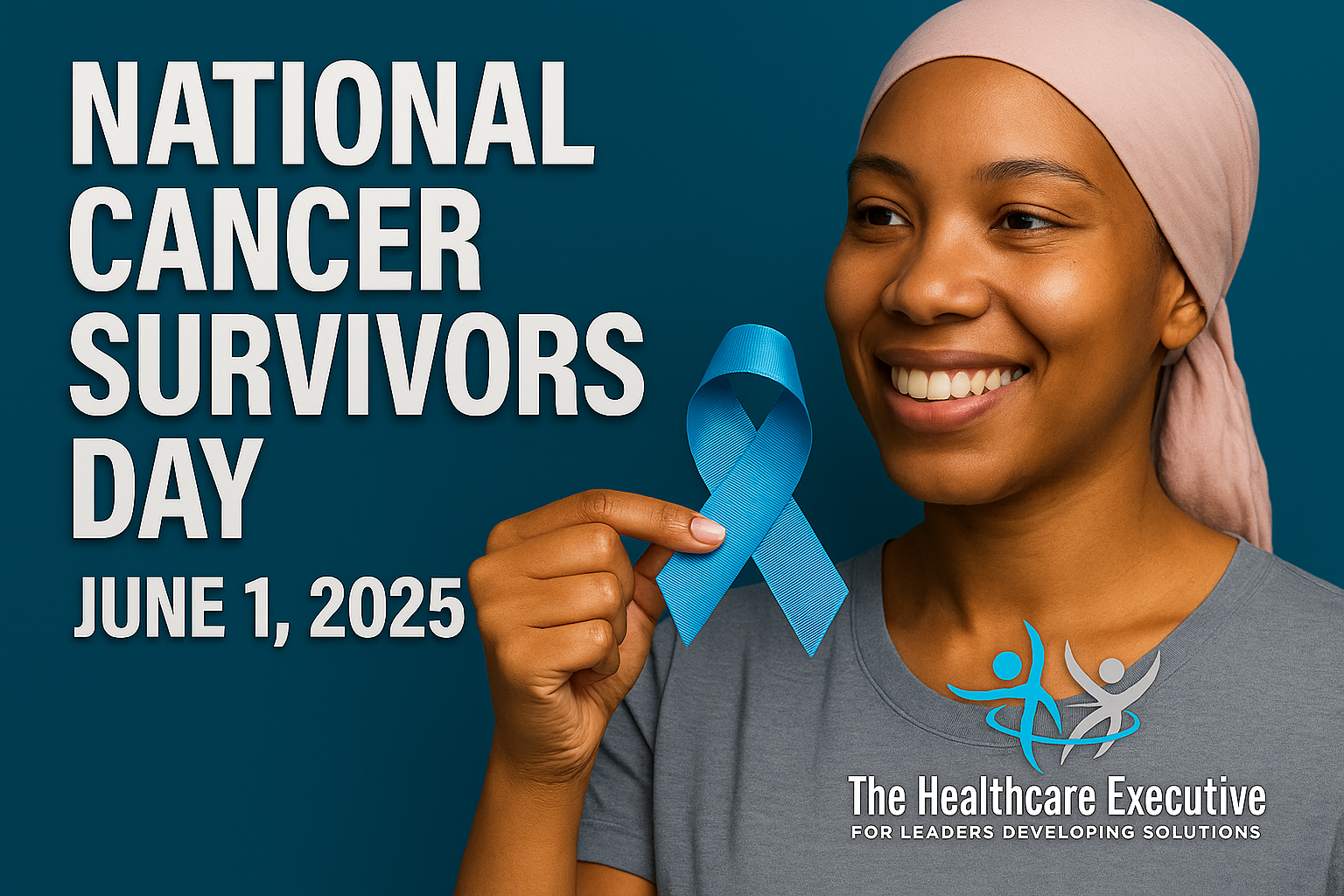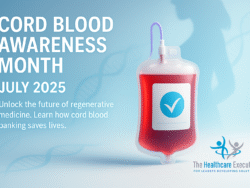National Cancer Survivors Day 2025 | Hospital Leadership in Survivorship Care

- Posted by Greg Wahlstrom, MBA, HCM
- Posted in Health Observance Calendar
Hospital Leadership in Survivorship Care
Published: June 1, 2025
National Cancer Survivors Day, observed annually on the first Sunday of June, honors the strength, resilience, and ongoing needs of millions of individuals living with and beyond cancer. As cancer survival rates improve due to advances in detection and treatment, survivorship has become a defining frontier in modern oncology. As noted in the AACR’s 2023 Cancer Progress Report, “Due to significant advances in early detection, treatment, and supportive care, more people than ever are living longer and fuller lives after a cancer diagnosis” (American Association for Cancer Research, 2023). Hospital leaders hold strategic responsibility to ensuring that cancer care does not end with remission—it continues with long-term, patient-centered survivorship support. Survivors often face lingering physical side effects, mental health concerns, and barriers to care continuity. Disparities persist in post-treatment support, particularly among rural populations, people of color, and the underinsured. To meet this challenge, executive leaders must embed survivorship as a core pillar of population health strategy. This includes integrating survivorship planning into discharge protocols and expanding access to psychosocial, nutritional, and rehabilitation services. Elevating patient voice and co-designing care with survivors themselves is no longer optional—it is essential. This observance calls hospitals to not just celebrate survivorship but to sustain it through leadership, empathy, and innovation.
Survivorship care is not one-size-fits-all. From pediatric to geriatric patients, care pathways must reflect the age-specific physical, cognitive, and emotional challenges that follow a cancer diagnosis. As researchers have emphasized, “Survivorship care must be tailored to the specific needs of each patient, taking into account medical history, age, psychosocial statues, and preferences” (de Leeuwenhoek et al., 2014). Hospitals can support this by offering specialized survivorship clinics, mobile health apps, and peer mentoring programs. Equity demands that these services be accessible regardless of language, geography, or socioeconomic status. Survivors from historically marginalized groups often encounter care gaps, stigma, and fragmented follow-up. Culturally competent teams trained in trauma-informed care can bridge these divides and foster trust. Hospital-based cancer centers must also collaborate with primary care providers to coordinate ongoing screenings, cardiac surveillance, and management of late effects. Data-driven quality improvement initiatives can track survivorship outcomes and inform targeted interventions. “Survivorship is no longer simply the period following active treatments—it is a dynamic, individualized continuum that requires proactive planning, navigation, and long-term support” (Journal of Oncology Navigation & Survivorship, 2025). Hospital executives must design systems that reflect this evolving reality. Through thoughtful planning and inclusive policy, hospitals can shape a survivorship experience marked by dignity, not disparity.
Employment, financial stability, and insurance coverage are imperative concerns for survivors—yet they are often overlooked in clinical settings. Hospitals should advocate for patients navigating disability claims, workplace accommodations, or return-to-work transitions. Oncology social workers and patient navigators can serve as essential allies in this process. As the Institute of Medicine notes, “psychosocial health services, including those provided by social workers and patient navigators, are critical components of quality cancer care, helping patients manage practical concerns such as employment, disability benefits, and financial strain” (Institute of Medicine, 2008). Survivorship care planning must go beyond physical recovery to address the socioeconomic stressors that threaten long-term well-being. This includes support for young adult survivors reentering education, caregiving parents managing fatigue, and older adults on fixed incomes. Innovative institutions are embedding financial navigators into oncology teams to improve access to care and reduce medical debt. Survivors also benefit from legal aid partnerships to address insurance disputes and employment discrimination. According to Legal Council for Health Justice (2022) notes, “Legal partners can identify gaps in hospital financial assistance programs and advocate for systemic changes to reduce inequity.” Equity audits of hospital financial assistance policies can help identify gaps that disproportionately affect survivors of color and rural residents. These are not ancillary issues—they are structural determinants of health. Hospital leaders have both the influence and obligation to create systems where no survivor is left to navigate alone. Survivorship is sustained not only by treatment but by advocacy, access, and infrastructure.
Mental health is an often-invisible frontier in cancer survivorship. Depression, PTSD, and fear of recurrence can affect survivors for years—yet mental health support remains underutilized. As Zebrack (2012) notes, “psychosocial services remain underutilized, under researched, and underrepresented in oncology follow-up care” (p.396). Hospitals can close this gap by normalizing psychological care as a standard part of oncology follow-up. Embedding behavioral health specialists within cancer teams ensures early identification and timely referral. Child life specialists, art therapists, and group counseling models can offer nontraditional yet highly effective avenues of healing. Telehealth expansion now allows survivors in remote areas to access mental health support without geographic limits. Executive teams must also ensure continuity of care between hospital-based and community mental health services. LGBTQ+ survivors, in particular, may face compounded isolation or discrimination and require identity-affirming mental health options. As researchers have suggested, “Providers should adopt LGBTP+- affirmation care models and consider trauma-informed approached to reduce barriers to care” (Bariola et al., 2022). Integrating trauma-informed practices hospital-wide can reduce barriers to disclosure and promote emotional resilience. As we celebrate survivorship, we must confront the invisible wounds with as much resolve as the visible. Hospital leadership must ensure that surviving cancer does not mean surviving in silence.
National Cancer Survivors Day is more than a celebration—it’s a benchmark for institutional accountability. As the National Cancer Survivors Day Foundation notes, “National Cancer Survivors Day is not just a celebration. It’s a call to action — for further research, more resources, and increased public awareness to improve the love of cancer survivors” (NCSD, 2024). It’s a chance for hospital leaders to assess how their systems support life after cancer. Equity in survivorship demands more than goodwill—it requires data, investment, and interdisciplinary collaboration. Partnerships with survivor-led organizations can inform more effective and empathetic care models. Philanthropy efforts can support research on long-term outcomes and fund support programs for underserved survivors. Executive leaders should ensure their hospitals participate in survivorship registries and align with national quality standards. From policy boards to patient rooms, leadership must center the survivor’s journey in every strategic conversation. The Healthcare Executive affirms: “A system that honors survivorship is a system that honors life.” On June 1, let every hospital recommit to making that promise real—not just for one day, but every day that follows.
Discover More
National Cancer Survivors Day is a time for hospitals to elevate compassion, continuity, and equity in oncology care. Executives can use this observance to evaluate survivorship strategies and align them with broader population health goals. Now is the time to act—not just in recognition, but in reform.
Internal Resources
External Resources
- National Cancer Survivors Day Foundation
- American Cancer Society
- OncoLink Survivorship Resources
- National Cancer Institute – Survivorship
- ASCO Cancer Survivorship
- American Association for Cancer Research. (2023). Supporting cancer patients and survivors. In AACR Cancer Progress Report 2023. https://cancerprogressreport.aacr.org/progress/cpr23-contents/cpr23-supporting-cancer-patients-and-survivors/
- de Leeuw, J., Larsson, M., & Kälvemark Sporrong, S. (2014). Cancer survivorship: A new challenge in follow-up care. Pharmacy Practice, 12(2), 486. https://www.ncbi.nlm.nih.gov/pmc/articles/PMC4164810/
- Journal of Oncology Navigation & Survivorship. (2025, January). Redefining survivorship. JONS, 16(1). https://www.jons-online.com/issues/2025/january-2025-vol-16-no-1/redefining-survivorship
- Institute of Medicine. (2008). Cancer care for the whole patient: Meeting psychosocial health needs. The National Academies Press. https://www.ncbi.nlm.nih.gov/books/NBK577643/
- Legal Council for Health Justice. (2022). Embedding health equity into hospital financial assistance programs. https://legalcouncil.org/health-equity-cbarecord/
- Zebrack, B. J. (2018). Psychosocial care of adolescent and young adult patients with cancer and survivors. Pediatric Blood & Cancer, 65(S1), e26905. https://www.ncbi.nlm.nih.gov/pmc/articles/PMC5865587/
- Bariola, E., Lee, H., Jenkins, E. K., & Thompson, L. (2022). Addressing psychological health challenges of LGBTQ+ cancer survivors. Current Oncology, 29(8), 5362–5372. https://www.ncbi.nlm.nih.gov/pmc/articles/PMC9263127/
- National Cancer Survivors Day Foundation. (2024). National Cancer Survivors Day is a day for us. https://ncsd.org/national-cancer-survivors-day-is-a-day-for-us/
- The Healthcare Executive. (2025). The Healthcare Executive. https://www.thehealthcareexecutive.net



